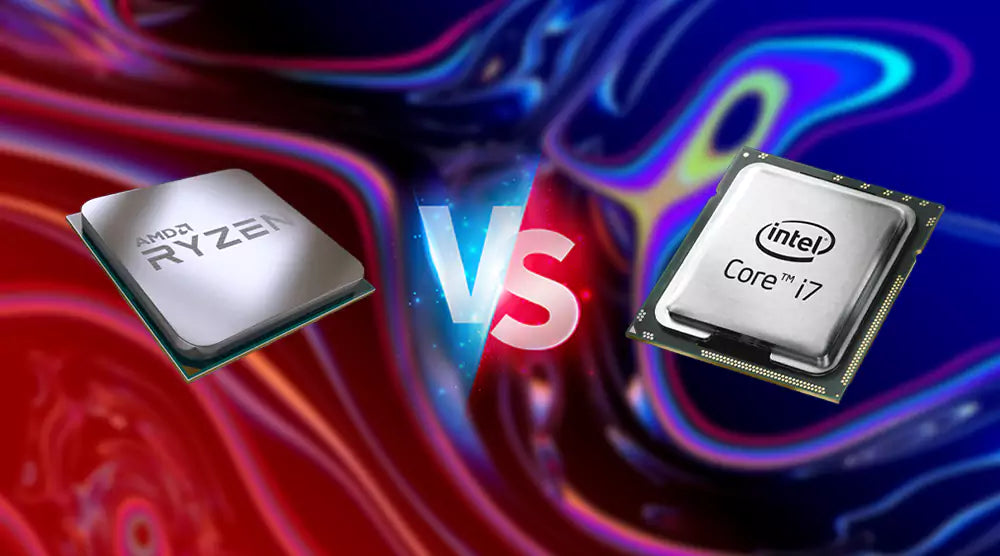As PC building gurus, we know that selecting the correct processor is one of the most important steps when considering any build.
Among the prominent top leaders, AMD Ryzen and Intel CPU are two major competitors, each with pros and cons.
In this article, we'll provide some guidelines on the AMD Ryzen vs Intel PC build debate so that you can make an informed decision by comparing these.
Overview Of AMD Ryzen And Intel Processors
There's hardly another brand in the processor world that can rival AMD and Intel in the crowns worn by these two.
Both have unique selling points. The AMD Ryzen presents excellent multi-core performance at very competitive prices, whereas Intel CPUs have always been known for high single-core performance—a reason they are prevalent for high-end gaming computers.
Why Choose the Right Processor for a PC Build?
The first and best thing to remember while building a PC is getting a good processor.
The processor, or CPU is the brain of your computer and has the most significant impact on your overall system speed and efficiency, especially if you tend to play games, edit videos, or multitask.
Now, let’s explore the strengths of AMD Ryzen and Intel to help you make your AMD Ryzen vs. Intel PC build decision.
AMD Ryzen Processors
Key Features And Advantages
The AMD Ryzen processors generally outshine the rest across the board, especially when dealing with multithreaded operations.
For instance:
Performance Comparison
While Intel processors still hold an edge in some benchmarks, the difference is not as significant.
If you do a lot of video rendering or 3D modeling, Ryzen performs best from Intel comparatively. However, regarding games, Ryzen has managed to cut into Intel's lead at high resolutions like 1440p and 4K since those tend to be more GPU-dependent than CPU-dependent.
The Ryzen 9 7900X cuts loose with excellent game performance and productivity performance.
Compatibility With Other PC Components
The AMD Ryzen Processors are based on the AM5 socket. As a result, they offer backward compatibility with older motherboards and upgrades for AM users are more affordable.
Their Ryzen chips also complement the high-performance DDR5 RAM and PCIe 5.0, so they are forward-thinking for your build.
Intel Processors
Key Features And Benefits
We all know about Intel processors and their relatively single-core solid performances. Good for high-frame-rate gaming are these.
Key new features in Intel's latest CPUs include:
Performance Comparison
You will see that Intel sometimes outperforms in games heavily relying on single-threaded performance.
Specific i7-13700K Intel chips often outscore the AMD rivals in some gaming benchmarks at 1080p resolutions.
Compatibility With Other PC Components
Intel processors only need a wide variety of available motherboards, which is typically needed in an upgrade, especially since most new Intel chips use the LGA1700 socket.
Nonetheless, Intel's latest processors do support DDR5 RAM along with PCIe 5.0, which makes them awesome for future-proofing.
PC Build Consideration
Budget Restriction
When it comes to budget it is the most critical factor when comparing AMD Ryzen and Intel. Traditionally, the former offers better value, mostly in mid-range and high-end models, where you get more cores and threads for the same amount.
Though sometimes more expensive, Intel offers unbeatable gaming performance at the top end.
Specific Use Case (Gaming, Video Editing, etc.)
Intel's higher single-core speed puts them slightly ahead if you mainly build a gaming PC.
However, if your work involves heavy multitasking or creative applications such as video editing or 3D rendering, AMD's multithreaded performance is a much stronger choice.
For everyday tasks or general productivity, both are admirable.
Future Upgrade Potential
AMD Ryzen processors offer a significant advantage when it comes to future upgrades. With the AM5 platform, you'll need to upgrade your motherboard less frequently, providing more flexibility for future updates.
In contrast, Intel's tendency to change the socket type with each generation means more frequent motherboard upgrades.
Conclusion
In conclusion, both AMD and Intel processors offer excellent performance, but the best choice ultimately depends on your specific needs and budget. For those prioritizing multithreaded workloads such as gaming, streaming, and video editing, AMD Ryzen processors provide exceptional value with strong performance across multiple tasks.
On the other hand, if you’re focused on high-frame-rate gaming at 1080p or single-core performance, Intel’s processors with higher clock speeds may offer a more suitable option, though at a slightly higher price.
Both AMD and Intel support the latest DDR5 memory and PCIe 5.0 technology, ensuring that whichever option you choose will be future-proof for years to come. Ultimately, your decision should be based on the balance of gaming, productivity, and your budget.
If you’re ready to build your dream PC, Technoid Inc. has you covered, offering a range of high-quality gaming PCs and components from both AMD and Intel, tailored to suit every need and price range.
Frequently Asked Questions (FAQs)
Is it better to use Ryzen or Intel?
It depends on your needs. AMD Ryzen prefers multithreaded tasks like video editing, while Intel is for single-core tasks and is a little better for gaming.
Is the Ryzen 7 better than the i7 for gaming?
Regarding gaming, Ryzen 7 is on equivalence with the Intel i7. However, it's suitable for multitasking when gaming and streaming and has more cores overall.
Is Ryzen or Intel more power-efficient?
Both offer power-efficient choices, but Intel's recent processors consume much less energy during gaming. At the same time, AMD performs well in multi-core tasks and has balanced power usage.
Is the Ryzen 5 better than the i7?
The Ryzen 5 is usually a mid-range processor and competes with Intel i5, not i7. For gaming and other basic levels of multitasking, the Ryzen 5 is a great value.

 United States
United States

